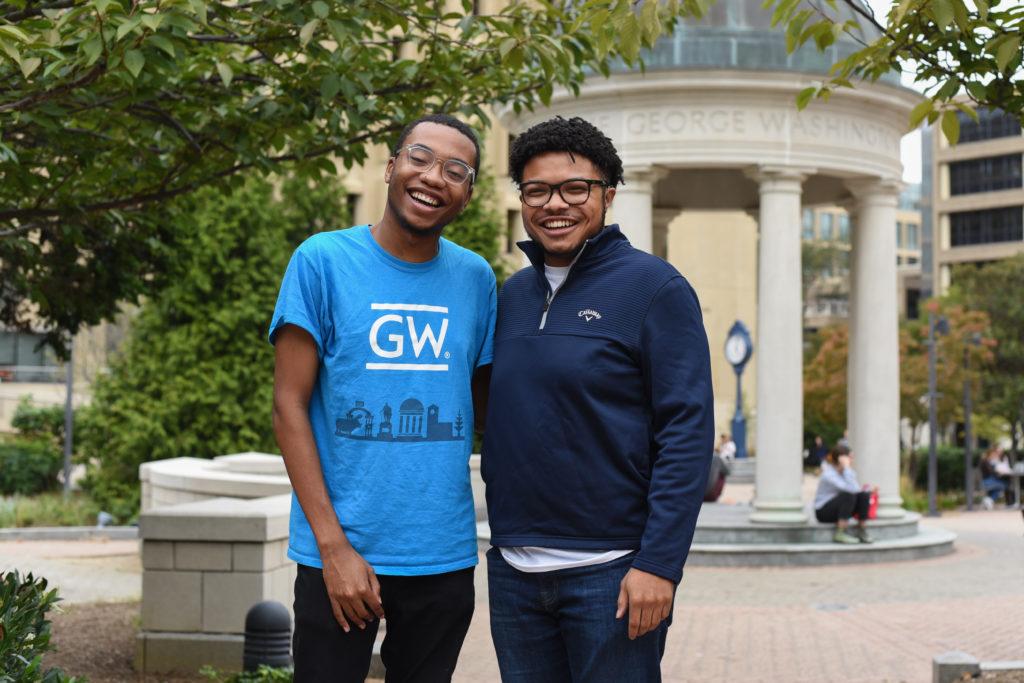The newly elected Student Association president and executive vice president said they are altering their communication with students as they transition into their roles during the COVID-19 pandemic.
SA Sens. Howard Brookins, U-at-Large, and Brandon Hill, CCAS-U, were elected Friday as the next SA president and executive vice president, respectively. The leaders said they will focus on transitioning into their prospective roles through weekly Zoom meetings with current SA leaders and updating students about communication with administrators via social media live streams while most students live off campus.
Brookins said dismissing students from campus and the delayed election date drew students’ attention away from the election, but candidates stepped up online campaigning efforts to bring student support to the race.
“It really shows that every vote mattered and every vote counted toward this election,” he said.
Brookins said he has conducted video calls with Christy Anthony, the director of the Office of Student Rights and Responsibilities, in the past three weeks to add examples of bias-related incidents to the Student Code of Conduct, one of his platform points. Brookins said one example he added to the code is a video that captured University President Thomas LeBlanc making insensitive comments earlier this semester.
“I’m very optimistic that through video call, voice call and other forms of communication, I will be able to communicate with any type of administrator I would like,” he said.
More than 80 percent of the student body voted in favor of supporting the University’s divestment from fossil fuels, and 93 percent of students approved of student voting positions on the Board of Trustees. Brookins said he will use live stream videos to communicate with students about any updates made on either referendum.
“It would be beneficial for somebody to be democratically elected to that position as it holds a lot of weight and can be very influential in terms of figuring out the process of which the school is run,” Brookins said.
Hill, the SA’s executive vice president-elect, said events in this year’s elections, like postponing voting days, triggering a lawsuit against the JEC and leaving candidates uncertain about voter turnout, were “unpredictable.”
He said he plans to prioritize transitioning into his role over the next few weeks and working on “time-sensitive” referendums, like calling on the Board to vote at its meeting next month to discuss cutting ties with the fossil fuel industry. He said he will continue meeting virtually with officials and SA members to prepare him to work over the summer in the SA and prep for the fall semester.
Hill said he plans to form a team of students from different communities, like women, students of color and Jewish students, who are not represented in the senate-elect or who have not historically been included in the SA.
“You learn to be a good EVP by watching the good EVP, and luckily, I’ve been able to be in senate meetings with EVP [Amy] Martin where I’ve learned a lot about running the senate and how it works and how her job works,” he said.
Hill said running for executive vice president was “more fun” than running last year for his senate seat because he could interact with more student organizations during the endorsement process. He said other memorable campaign moments included grabbing food from GW Deli with Andy Liapusin, his sole opponent, and seeing his social media posts received “so kindly.”
“Being able to actually go out and ask for endorsements and receive a good chunk of them was really humbling and made me feel like the work I hope to do was influential and impactful,” he said. “And although it was very crazy, I think it’s definitely memorable and I wouldn’t want it any other way.”
Kyle Piekarski, the chairman of the Joint Elections Commission, said the four members of the JEC, including himself, calculated the same numbers for the ranked-choice ballots cast for the president and executive vice president seats.
“We all got the exact same numbers so that made me happy,” Piekarski said. “Ranked-choice was less of an obstacle than we thought in terms of actually doing the calculations and I think in future years, it’ll only be easier now that we have a firm set of instructions as to how to do it.”
The senate updated the SA bylaws last semester to run elections through an electronic ranked-choice voting ballot. The switch from the former voting platform, OrgSync, to the new system, Engage, gave students the option to rank their preferences for the president and executive vice president seats this year.
Piekarski said JEC members will propose a set of recommendations for next year’s election, like using ranked-choice for all future senate races. Other than a decline in voter turnout, sending students back home did not impact the election, he said.
About 3,800 ballots were cast in this year’s election, roughly a 20 percent decrease from last year’s election of almost 5,000 cast ballots. Piekarski said students were supportive throughout the election of new events, like the open-mic town hall.
“The only difference was we weren’t on campus,” he said. “So I don’t really think I have as good of a gauge as to how the student body as a whole felt because I’ve seen fewer reactions but it was overwhelmingly positive. We got a lot of positive feedback.”








